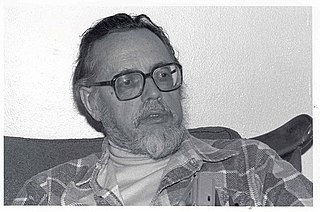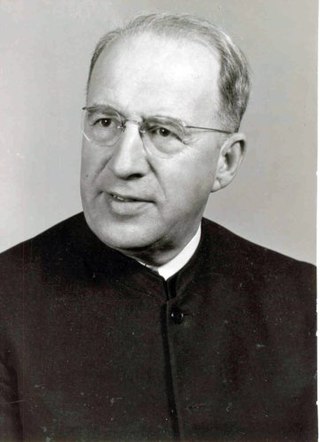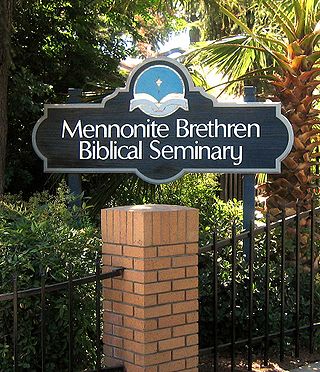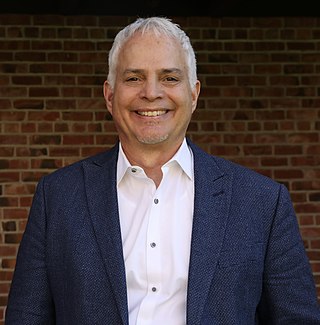
Mennonite Church Canada is a Mennonite denomination in Canada, with head offices in Winnipeg, Manitoba. It is a member of the Mennonite World Conference and the Evangelical Fellowship of Canada.

The Canadian Conference of Mennonite Brethren Churches (CCMBC) is a Mennonite Brethren denomination in Canada. It is a member of the Mennonite World Conference and the Evangelical Fellowship of Canada.

Bethany Theological Seminary is the official seminary of the Church of the Brethren. Bethany, located in Richmond, Indiana, is accredited by the Association of Theological Schools in the United States and Canada and the Higher Learning Commission.

John Howard Yoder was an American Mennonite theologian and ethicist best known for his defense of Christian pacifism. His most influential book was The Politics of Jesus, which was first published in 1972. Yoder was a Mennonite and wrote from an Anabaptist perspective. He spent the latter part of his career teaching at the University of Notre Dame.
The Mennonite Historical Library (MHL) is considered the world's most prominent and complete collection of resources and artifacts pertaining to Mennonites and related Anabaptist groups. It is housed in the Harold and Wilma Good Library on the campus of Goshen College in Goshen, Indiana. The specialty library was founded in 1906 under the guidance of Harold S. Bender and Ernst Correll. Historian John D. Roth is the current director.

Harold Stauffer Bender was a prominent professor of theology at Goshen College and Goshen Biblical Seminary. His accomplishments include founding both the Mennonite Historical Library and The Mennonite Quarterly Review. He served as president of the American Society of Church History, and was a major scholarly influence on fellow Mennonite theologian John Howard Yoder.

Fresno Pacific University Biblical Seminary, formerly the Mennonite Brethren Biblical Seminary, is the denominational seminary of the United States Mennonite Brethren Churches. It was founded in 1955 in Fresno, California. The campus is located on the campus of Fresno Pacific University in southeast Fresno.
Wadsworth Institute was a Mennonite seminary in Wadsworth, Ohio, from 1868 to 1878. Officially named the "Christian Educational Institution of the Mennonite Denomination", it accepted men aged 18 to 35 for a three-year program centering on biblical studies and other topics relevant to training pastors and mission workers. Starting in 1876, women were accepted as day students. Classes were primarily taught in German and some in English.

The General Conference Mennonite Church (GCMC) was a mainline association of Mennonite congregations based in North America from 1860 to 2002. The conference was formed in 1860 when congregations in Iowa invited North American Mennonites to join together in order to pursue common goals such as higher education and mission work. The conference was especially attractive to recent Mennonite and Amish immigrants to North America and expanded considerably when thousands of Russian Mennonites arrived in North America starting in the 1870s. Conference offices were located in Winnipeg, Manitoba and North Newton, Kansas. The conference supported a seminary and several colleges. In the 1990s the conference had 64,431 members in 410 congregations in Canada, the United States and South America. After decades of cooperation with the Mennonite Church, the two groups reorganized into Mennonite Church Canada in 2000 and Mennonite Church USA in 2002.
Located in Smithville, Ohio, Oak Grove Mennonite Church is an historical church that has made a significant contribution to the larger Mennonite denomination, currently pastored by Doug Zehr. Oak Grove started as an Amish church in 1818, as many Amish started settling in Wayne County, Ohio. From humble beginnings the church grew and built a meetinghouse in 1862, one of the earliest of such meetinghouses the Amish have built.
Alan Kreider was an American Mennonite historian. He was the American Professor Emeritus of Church History and Mission at the Anabaptist Mennonite Biblical Seminary in Elkhart, Indiana. His main interests were mission, worship, peace, and ecclesiastical history. Kreider continued to speak, write and publish in these areas of interest until his death in May 2017.

Rosedale Bible College (RBC) is a private evangelical Anabaptist junior Bible college in Rosedale, Ohio. RBC offers an Associate in Biblical Studies accredited by the Commission on Accreditation of the Association for Biblical Higher Education. The college is owned by the Rosedale Network of Churches, a coalition of roughly 120 widely scattered churches within the Mennonite family of faith, and united by a evangelical-Anabaptist theology.
Steinbach Bible College is an evangelical Anabaptist college located in Steinbach, Manitoba, Canada.

James E. Brenneman is the president of Berkeley School of Theology, Berkeley, CA, one of the founding seminaries of the Graduate Theological Union. Prior to coming to Berkeley School of Theology in 2017, Jim was the sixteenth president of Goshen College, Goshen, Indiana (2006-2017). Originally from Kalona, Iowa, Jim grew up attending school and church in Ybor City, the Cuban quarter of Tampa, Florida. Jim is an ordained Mennonite minister and was the founding and lead pastor of Pasadena Mennonite Church from 1986-2006. He also served on the faculty of the Episcopal Theological School at Claremont for 15 years, where he taught Hebrew Bible. He lived in South Pasadena, CA for 26 years prior to moving to Goshen, Indiana in 2006, returning to CA in 2017. He and his wife, Terri J. Plank Brenneman, a clinical psychologist, have one son, Quinn Miguel Plank Brenneman. On December 31, 2006, Brenneman was selected by the Elkhart Truth to be one of the "Ten People to Watch in 2007".

Columbia Bible College (CBC) is an evangelical Mennonite Bible College in Abbotsford, British Columbia, Canada. It is affiliated with two regional Mennonite conferences, British Columbia Mennonite Brethren and Mennonite Church British Columbia. Columbia is accredited by the international Association for Biblical Higher Education (ABHE), and is registered with the British Columbia Private Career Training Institution Association (PCTIA).
The Mennonite Church USA Archives was founded in 2001 under the denominational merger of the (old) Mennonite Church and the General Conference Mennonite Church. Prior to 2001, the two largest Mennonite denominations maintained separate archives: the Archives of the Mennonite Church, located on the Goshen College campus, housed materials pertaining to the (old) Mennonite Church, while the Mennonite Library and Archives on the Bethel College campus held the records of the General Conference Mennonite Church.
John C. Wenger was an American Mennonite theologian and professor.
George Jay Lapp was an American missionary to India for the Mennonites. He was ordained in 1905 and became a Bishop in 1928 while in India. Lapp served as interim president of Goshen College from February 1918 until June 1919.
Myron Augsburger is an American Mennonite pastor, professor, theologian, and author. He is the former president of both Eastern Mennonite College and the Council for Christian Colleges and Universities.
Mennonite Brethren Centenary Bible College (MBCBC), founded in 1920, is a Mennonite Bible College in Shamshabad and is affiliated with the Conference of the Mennonite Brethren Churches in India and the nation's first University, the Senate of Serampore College (University)with degree-granting authority validated by a Danish charter and ratified by the Government of West Bengal.











